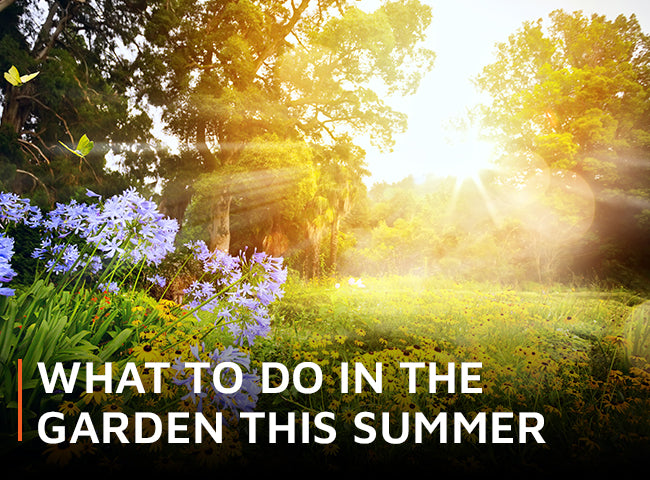Now that the summer is in full swing, there are plenty of jobs for you to be getting on with in the garden. To keep on top of your garden maintenance, we’ve made a list of all the gardening jobs you’ll need to manage this summer until the autumn rolls around.
Lawn maintenance

Image source: StockWithMe via Getty Images.
While lawn maintenance is a year-round job, summer is when the grass will be growing most. You should aim to be cutting your grass at least once a week, depending on how much it’s growing. Over the spring months and throughout the summer, lower your mower blades until the grass is roughly 2-3cm in height. As we go into autumn you’ll want to heighten the mower blades again as the grass starts to slow down with its growth.
During periods of drought, your lawn will start to stop growing as voraciously as it has been during the cooler temperatures. While you should continue watering it if you’re not in an area with a hosepipe ban, you should avoid cutting your grass so as to not stress it out too much. If you’re not able to water it, don’t worry - your grass will bounce back to its usual vibrant self once the rain returns. For more detailed lawn care advice, take a look at our ultimate lawn care guide.
Caring for roses

Image source: pcturner71 via Getty Images.
To give your roses the best chance to blossom, you’ll need to dead-head them regularly so as to promote bushier growth, and encourage more flowers to bloom for as long as possible. Make sure to cut just above the leaves; by cutting further down the stem, you’ll be keeping your rosebush more compact, and it will take longer for new flowers to grow.
Water potted plants

Image source: ChamilleWhite via Getty Images.
It’s important to remember to water your garden plants during the summer, especially during hotter weather when they’ll be more likely to wilt, but it’s especially important to water your potted plants. Plants in containers dry out quicker than your flowerbeds will, so it’s important to water them regularly to maintain healthy plants.
Potted plants can also use a dish under them to catch the water that drains out of the soil - this way they can gradually drink the water throughout the day. Or if you don’t want to be walking around the garden with your hose or your watering can, why not take a look at an automatic watering system? These make sure that your plants get a regular supply of water throughout the day.
Seasonal pruning and garden clearance

Image source: chiewr via Getty Images.
Once any late-flowering plants from spring have finished flowering, dead-head and prune them back so as to promote even more growth for next spring. Prune any hedges so as to keep them in shape for later in the season, and trim leaves from tomato plants - pruning reduces the amount of water your plants need in order to live. If any of your garden’s trees or shrubs have shed smaller branches or early bouts of fruit, clear this away and place in your compost bin or burn them.
Prevent disease

Image source: schulzie via Getty Images.
Keep an eye out for any diseased leaves or plants so you can get rid of them as soon as possible to prevent anything from spreading to your other plants. It’s best to dispose of any diseased matter either through general waste or through burning - you’ll want to avoid adding any diseased leaves to your compost, as this will mean you can’t use your carefully cultivated compost in the rest of your garden.
Treat your fencing and shed

Image source: RusN via Getty Images.
Now is the time to start treating your fencing and wooden shed with a wood preservative treatment. It’s important to do this annually so as to protect your garden building from the elements throughout the year, as this will make sure that your shed lasts for as long as is physically possible. During the hotter months, you can make sure that your shed dries out thoroughly after treating before you add a second coat, rather than be interrupted by rain and having to wait longer to finish the job.
Border maintenance

Image source: herreid via Getty Images.
By keeping on top of regular border maintenance, you’ll be ensuring that they look their best over the summer months. Make sure to cut back any early flowering plants to encourage a second display of bright flowers towards the end of September. You can also keep an eye out for any weeds or diseased or sickly material and deal with it as soon as possible before it becomes a bigger problem.
Are there any important summer gardening jobs that you think we’ve missed off our list? Let us know via our Facebook page.
Lead image: BethAmber via Getty Images.




